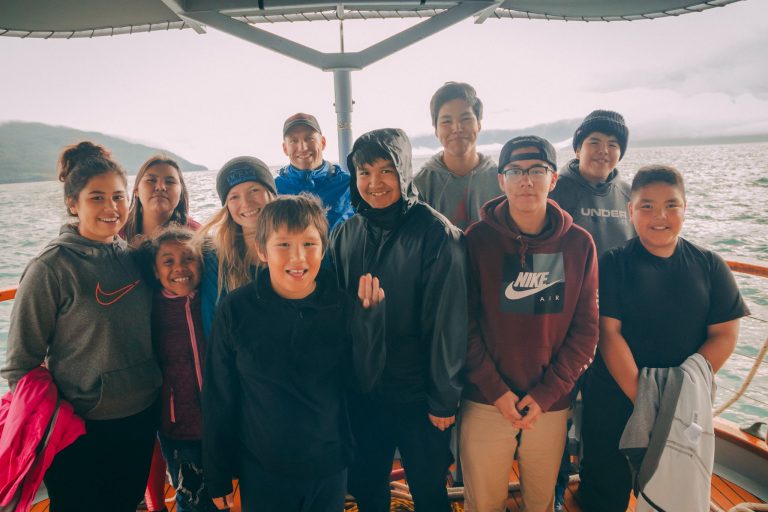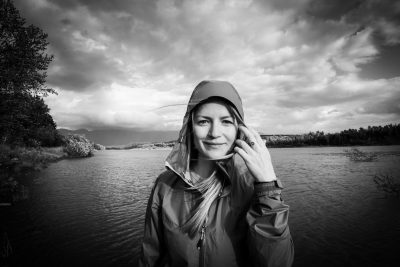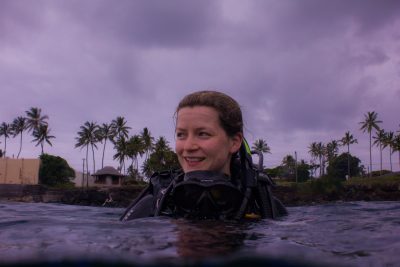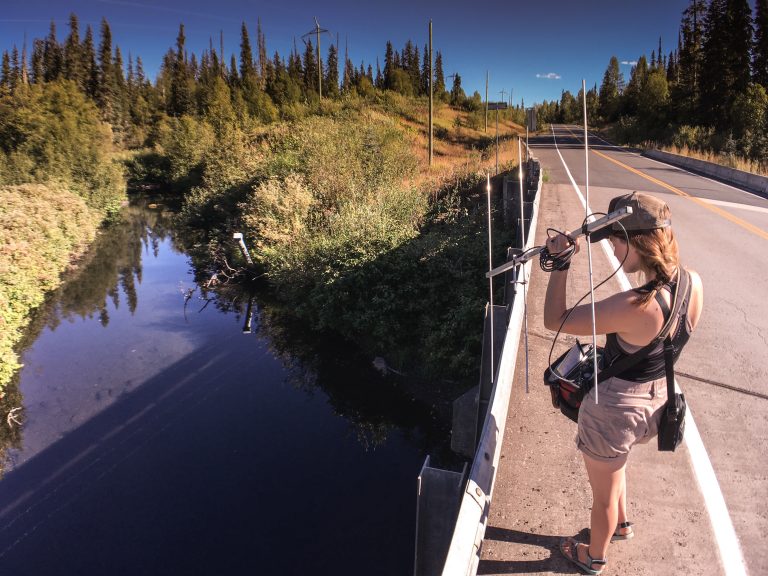
Andrea Reid and John-Francis Lane with their salmon science camp participants from the Nisga’a village of Gingolx in the Portland Inlet on B.C. north coast in 2018. Credit: Andrew Stewart
A new Centre for Indigenous Fisheries (CIF) is being launched at University of British Columbia, with Indigenous fisheries scientist, conservation biologist and Nisga’a Nation member Dr. Andrea Reid joining as Principal Investigator.
The CIF, which will be based at the Institute for the Oceans and Fisheries, aims to support the management of aquatic ecosystems and fisheries in Canada and beyond by combining Indigenous knowledge systems and modern science. Professor Emerita and fisheries historian Dr. Dianne Newell will serve as the Interim Director, and a second faculty appointment is anticipated for the near future.

Andrea Reid on the Skeena River, just outside of Terrace, B.C. in 2018. Credit: Talon Gillis
What do you hope to achieve with the new Centre for Indigenous Fisheries?
We are working towards a future where culturally significant fish and fisheries are valued and protected in the long-term. Our research is fundamentally community-centred, employing both Indigenous research methodologies as well as tools and understandings from both Indigenous and Western sciences. This research will be done with communities, not on them – with their permission, oversight, and in response to community needs. Indigenous knowledges, methods and values will fundamentally steer what we do, how we do it, and where we go.
Teaching and training will also be a huge component of this work. We have already recruited new graduate students to our team, the majority of whom are Indigenous. We are also working to bring forward new courses at UBC aimed at providing guidance to those who are working with Indigenous community partners or seeking to do so, or who wish to become knowledgeable of Indigenous issues, histories, and knowledge systems in this country.
Can you share examples of some projects CIF will be undertaking?

Andrea Reid surfacing after a dive on Moloka’i, Hawai’i, where she and colleagues were using photogrammetry to document changes in coral reef structures in 2014. Credit: Mikayla Wujec
This project is made possible by a grant from the National Geographic Society, and will be co-led by myself and three fellow National Geographic Explorers: Lauren Eckert, a conservation scientist; Amy Romer, a documentary photographer and storyteller; and Rena Priest, a poet and writer from the Lhaq’temish (Lummi) Nation.
Through a combination of archival research, workshops and interviews with fishers and knowledge keepers, it is our ambition to share the under told story of how Indigenous fisheries and stewardship practices have been usurped, dishonoured, thwarted, appropriated and criminalized through colonization. Canoes, boats, nets and other fishing gears have repeatedly been confiscated; fishers have been excluded from fishing certain waters; in many cases they have faced large fines or incarceration; and threats of violence have been acted upon by authorities when fishers have stood up for their inherent rights. In not acknowledging and reckoning with this history and reality, there can be no lesson taken from it, locally or beyond.
We will also work with interested community partners to explore what more just and sustainable futures look like in their view for Indigenous fishing communities in the Salish Sea, and we hope to shine a big spotlight on these issues and solutions through multi-media storytelling.
Why is research like this important?

Andrea Reid using a radio telemetry receiver to listen for radio-tagged sockeye salmon in the Nass River watershed in northern B.C. in 2016. Credit: Colin Middleton
If we don’t understand the histories and rich contexts of these human dimensions, and if we don’t include associated communities equitably in the research process, then we’re missing a big part of the puzzle and risk continuing research practices that are potentially extractive and quite harmful. The United Nations Declaration on the Rights of Indigenous Peoples (UNDRIP) and other policy instruments like the Truth and Reconciliation Commission Calls to Action ask something much different from us as researchers.
In another project CIF is launching this year, we are partnering with several First Nations in the Lower Fraser to co-develop biocultural indicators of aquatic ecosystem and fish health. This is being modelled after the Māori Cultural Health Index which was developed to help Māori meaningfully participate in the management of fresh waters in Aotearoa, or New Zealand, so that how the health of these systems is measured also reflects Māori values and knowledge. We hope to bring this framework here, so we can have a toolkit option for B.C. First Nations that creates a pathway for bringing Indigenous perspectives and knowledge of aquatic health into management decisions and actions.